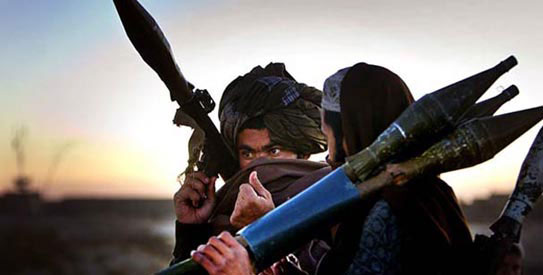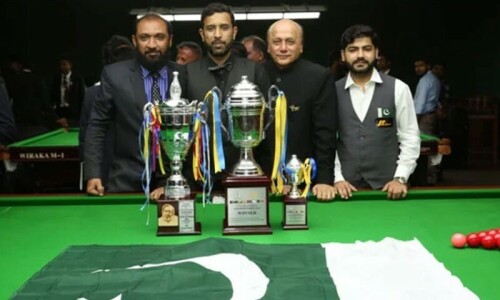This is the third part of a series on the Muslim identity crisis. Find part one here and part two here.
Last week’s witchhunt in a Karachi park, that led to the sacking of a TV anchor, depicts our crisis of identity more aptly than any other incident in the recent past. In a way, it is linked to other events as well — suicide-bombings, attacks on religious minorities and even the Sept. 11, 2001 attack on New York’s twin towers.
All these events have one common thread: they betray a desire for immediate change through violent and subversive means. And this desire is a byproduct of intellectual bankruptcy. An intellectually rich society does not seek quick-fixes. It does not seek to resolve social and cultural issues through violent means. And it knows killing people does not resolve anything.
A de-intellectualised society does not have the depth to hold back, review, analyse and come forth with an intellectual response. Its responses are always violent.
The problem is that the culture that taught patience and tolerance is dead. After 200 years of colonisation, Muslim societies have become barren; incapable of providing the intellectual infrastructure that produces tolerance and patience.

Yet, there’s no denying the fact that now we live in the post-Taliban and post-al Qaeda era. The two violent movements and their off-shoots have outlived their utility. Muslims across the world are now searching for new ideologies. The Arab spring is toppling long-established tyrannies. In Pakistan, a free but irresponsible media and judicial activism are redefining the relation between the state and the individual.

Religious extremism associated with groups like the Taliban and al Qaeda had a devastating affect on the Muslim culture, particularly in Pakistan and Afghanistan. It undermined the state structure and killed tens of thousands of people. It created a state of permanent insecurity and fear for women and minorities; and provided no alternative social, economic or cultural infrastructure because it never meant to do so.
But what will the post-Taliban era offer us? More radicalisation? Democracy and human rights? A mixture of the two? Or more confusion?

It is difficult to give a clear answer to these questions now but one thing is obvious: suicide bombings do not resolve anything. Nor do the floggings we Pakistanis suffered during the Zia era. Radical Islam has created so much fear that Muslims are now afraid of going to mosques for prayers. So what next? Before we try to understand the future, let’s have a look at our immediate past.
In Pakistan, we grew up in a culture which, although heavily influenced by our religious beliefs, retained its secular characteristics. Poetry, music and painting were — and perhaps still are — an integral part of this culture.

For most South Asian Muslims, the most cherished religious memory is that of milad, a practice common in other Muslim cultures as well. But in the Subcontinent a milad is also a colorful cultural event. It includes recitation of poetry and religious songs. The religion that Muslims learn at milad is one of love and tolerance.
It is also at these gatherings that we are introduced to Sufi poetry, which defines all paths as leading to the same destination.
A modern South Asian Muslim is also influenced by the literature written in the later 19th and 20th centuries. The strongest influence is that of Dr. Mohammed Iqbal, who, writing in early 20th century India, had a huge influence on Muslim thoughts in South Asia.
Secular poets and writers like Faiz Ahmed Faiz and Saadat Hassan Manto, who top the list of popular South Asian intellectuals of the mid 20th century, introduced Marxist and liberal Western thoughts to their readers. Even Faiz’s marxism was of a South Asian nature — mild and romantic.
The popular Islamic culture of South Asia also owes much to poets like Amir Khusro and Ghalib and Muslim masters of the Indian classical music. But they cannot match the influence that Sufi poets like Bulleh Shah, Shah Latif and Rahman Baba continue to enjoy, even now.
It is a culture that allows people like Ghalib to “seek an idol in Kaaba (Mecca)” and encourages Khusro to declare, “It is the man who is the center of his prayers rather than the holy mosque in Mecca.” Even in modern times South Asian Muslim writers have raised probing questions about the very basis of Islamic faith without causing a violent popular reaction.
This popular culture has had little difficulty coexisting with other South Asian religions and has attracted many followers from other faiths who visit the shrines of Muslim saints in both India and Pakistan. It has encouraged people like Prem Chand, Krishan Chandar and Firaque Gorakhpuri, all Hindus, and Rajinder Singh Bedi, a Sikh, to write literature in Urdu, basically a language of the South Asian Muslims, using Muslim symbols and metaphors.
Such blending of cultural and religious traditions and the coexistence of Islamic values with local traditions and Western influence is not confined to South Asia. Most Muslim nations continue to experience such mingling traditions.
However, confusion and contradictions emerge in the realm of politics, particularly the politics practiced by groups identified as militant Muslims. So far political Islam has failed to attract strong popular support but its influence is increasing. This is because of a general disenchantment with the current political system and the ruling elite.
The Arab spring showed that most Muslims strongly dislike the political set up that they live in. Before this brave uprising shook the Middle East, people showed their dismay by staying away from fake elections held by their governments, allowing the rulers always to proclaim a sweeping victory for themselves.

Widespread corruption and the failure of a political system that does not address social and economic weaknesses of the society is the apparent cause of this disillusion. In Pakistan, people don’t trust the English speaking ruling elite. There is a general perception that they may be good at making money but they have no desire or training to do anything for others. Gone are the days when people looked up to the Western educated elite and believed that with their knowledge and expertise they could help change the society.
Disillusion with the Westernised elite turns into a dislike for the West when they see Western governments supporting corrupt and morally bankrupt rulers in the Muslim world. The West is seen as a bully bent upon maintaining its hegemony over the Arab and Muslim worlds with the help of the corrupt Muslim elite.
But despite this there is still a widespread respect for Western education and technology which many believe could help them jump several steps up on the development ladder. So people want Western education but not Western culture. However, this attitude is full of contradictions. Everybody speaks against the Western culture but people still watch Western movies and listen to songs.

Until recently this was confined to the upper and middle classes but now even the lower middle class is developing a taste for American films and music. As soon as they get money, people send their children to English medium schools.
Thus the West is revered, even if grudgingly, for its prosperity and scientific achievements. But the possibility of benefiting from the West or Westernised education is still only available to less than 20 per cent of the population, most people don’t benefit from it. They continue to live in abject poverty. In fact, no changes have had any impact on their lives.
Ask any man, or woman, in the street about how democracy was different from a military rule or monarchy, he/she would see no difference. “We struggle for bread, clothes, democracy or no democracy,” would be the standard answer.
In Pakistan, the slogan for roti, kapra aur makan (food, clothes and shelter) was made popular by the late Prime Minister Zulfikar Ali Bhutto in the 1970s. Similar promises were made by other left-leaning leaders in the Arab world as well. But they did little to make them available to those who need them most. Nothing seems to work in the Islamic world, capitalism or socialism.
Political ideas and economic theories — Islamic, socialist and dictatorial — of all ilk and brand have been tried here. All failed. No country suffered under this ideological conflict more than Afghanistan.
The cold war brought the Russians who brought superpower-rivalry to this unfortunate country. Both the Russians and the Americans — and their allies — created dozens of armed groups who are still fighting each other. Hundreds of thousands died during the Soviet occupation, 1979-1989. But what followed the Russian withdrawal was even worse.
More than 50,000 were killed in Kabul alone during the first Mujahideen government which ruled the country from 1993-96. They paved the way for the Taliban takeover in 1996. The Taliban brought even more suffering and turned Afghanistan into an international pariah by sheltering terrorists like Osama bin Laden and his al Qaeda network.
They were pushed out of power by the United States after the Sept. 11, 2001 terrorist attacks in America. It brought a US-supervised democracy, which is as corrupt and inefficient as were the Taliban, Mujahideen or communist rulers of the recent past. Why? Is it because the Western concept of a nation state does not fit well in Muslim countries?















































